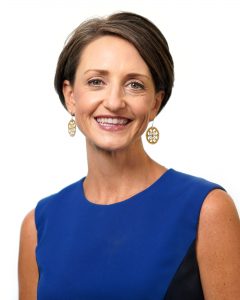April 18, 2020 // National
A virus challenges a U.S. culture that may need the lessons it can teach
WASHINGTON (CNS) — A particle invisible to humans with the naked eye has hurt the preferred psychological armor those in the U.S. most like to wear: the busy lifestyle.
It put a stop to almost everything we loved and even hated, from the mundane office meeting to the enviable vacations and fun family activities posted on Instagram and Facebook, the conferences we attended, and even the religious rituals and obligations we most cared about.

Emily Cash, a psychologist and director of the Saint Luke Center in Louisville, Ky., in seen in this undated photo. In an April 8 interview with Catholic News Service, she said that focusing on life one day at a time can help with anxiety and depression some might be experiencing and brought about by the confinement people are experiencing during the coronavirus pandemic. (CNS photo/courtesy Saint Luke Institute)
When the threat of the coronavirus began shutting down U.S. cities and towns, then activities one by one in mid-March, it also began chipping away at the country’s “very busy, achievement-oriented culture,” said Emily Cash, a psychologist and director of the Saint Luke Center in Louisville, Kentucky, part of the Saint Luke Institute clergy treatment center based in Silver Spring, Maryland.
In the U.S., “we focus on productivity, we focus on what we can accomplish, how hard we’re working. … We all tend to wear that with a lot of pride,” she said in an April 8 interview with Catholic News Service.
And though the present confinement can bring on what can seem like a heavy weight on our psyche, it also can bring a great spiritual opportunity, one we often hear about but may not stop long enough to truly take in during our busy lives.
“From the spiritual perspective, the huge challenge for all of us is how do we internalize the knowledge that God loves us for what we are, not what we do, not what we produce or what we accomplish,” Cash said. “In this moment, we’re all forced to be still and redefine business and redefine productivity, and be still in a way that we’ve never really been called to do. How can we, maybe deepen our faith, our understanding that God loves us, in spite of what we’re not producing, exactly because of who were are … and accepting that in a different way? I think that really can be very powerful for folks.”
As the pandemic seems to advance each day in the U.S. with no certain timeline of when it will end, she urges those with anxieties to focus on the day ahead.
“What I’m encouraging my clients to do … is to focus less on an end date and more on one day at a time,” she said. “What do I need today? What can I do today? How do I ground myself today? Because when we fixate on those end dates and those are not met, we are faced with a whole other rush of anxieties and disappointments and so trying to deal with one day at a time, moment by moment, can be a real anchoring experience for folks.”
When authorities began encouraging the now widespread stay-at-home orders, the adrenaline of the situation allowed people to put stress aside, to some degree, she said, “but the uncertainty and length of this, for all of us is a challenge.”
Those dealing with coronavirus anxiety may be experiencing post-traumatic stress, depression and anxiety, sleep disruption, confusion, anger, fear, frustration and boredom, she said, in a video posted on Saint Luke’s website. She encourages those trying to manage the anxiety to get the facts from sources such as the Centers for Disease Control as well as local authorities.
But she warns not to do too much of a “deep dive” into information, to limit activity that might prove to be too stressful at the end of the day and to practice self-care.
She encourages clients to think about their physical, emotional and psychological and spiritual spheres, thinking of each one as a bank that you have to put money into each day.
“So, what am I going to do for myself spiritually today? That’s going to look like a shared prayer with a (virtual) community, a spiritual reading … I know I need more laughter in my life: Am I going to watch a funny YouTube video? Am I going to call a friend?”
Evenings should be about planning out the next day: what to accomplish, even if it’s broken into one-hour chunks or 30-minute chunks, she said.
“We want control of what we’re doing,” she said. “When we feel healthy, we want control over our structure, we are productive. When we are able to connect, we feel better. Building elements of that into the day is something I’m really encouraging folks to do.”
Even after the crisis has ended, it may take a while for the world to return to the one we knew, she said.
“I think there’s going to be increased caution,” she said.
Though people may experience a sense of freedom, people may also have a feeling of uncertainty, lack of security, trust.
“So, I think it will be a little bit of a push and pull and dance as we all come back from that,” she said.
When she works with clients who have experienced trauma, she explains that there’s an emotional peak of that experience and then as you heal, little aftershocks appear that may take months or years to settle.
But until that happens, she encouraged compassion for oneself and for others.
“Ideally what we’d like to be able to do is greet each day with a different level of peace because what we know is that we, as a country, as a world, we’ll be facing a lot of loss, “ she said. “There are certainly communities that have already been faced with that. But I think what we know, from the numbers and from that data, is that we will continue to face that (loss). There’s a way in which, if we can focus on one moment at a time, we’ll be more equipped and better prepared to be able to handle that and to come out on the other side.”
The best news. Delivered to your inbox.
Subscribe to our mailing list today.






